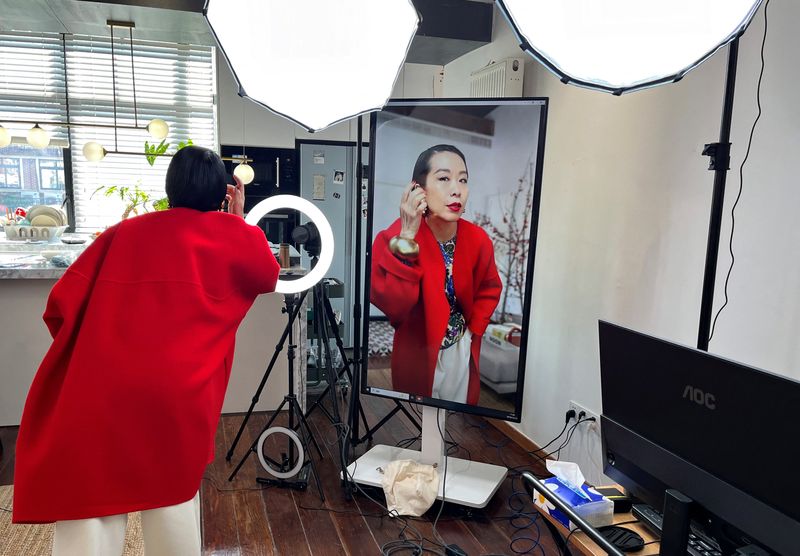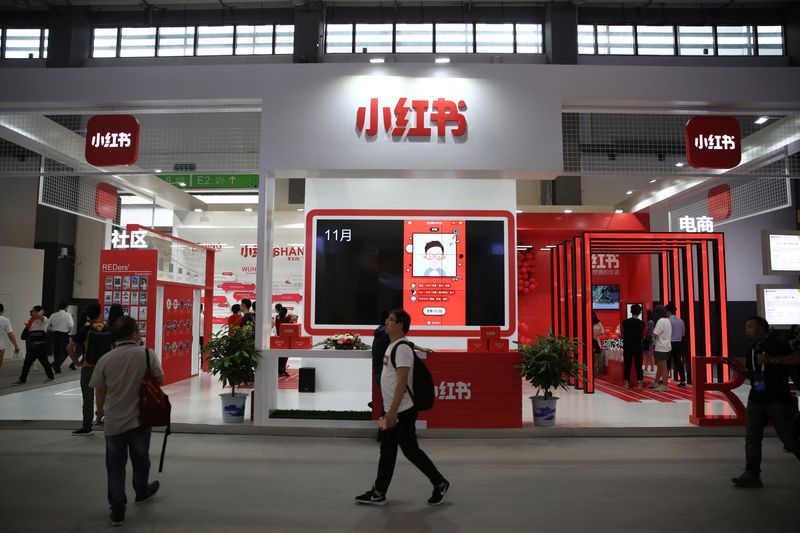By Casey Hall
SHANGHAI (Reuters) - Since Tera Feng started documenting her enviable Shanghai lifestyle, including visits to art galleries and fashion events on Chinese social media eight years ago, she has built up a following of more than 500,000 people.
While that is a drop in the vast ocean of China's consumer market, Feng and brands she works with have found her audience - mainly financially independent urban Chinese women - is willing to spend.
A recent switch to livestream selling on social media platform Xiaohongshu three months ago has seen Feng sell everything from a 15,000 yuan ($2,060) Carven suit to her favorite brand of rice that costs 60 yuan for a 1 kg bag.
Xiaohongshu, sometimes compared to Instagram, has long been one of China's most important marketing tools. It has made several e-commerce pushes over the past decade without much success.
But now, consultants say brands, especially those peddling niche and high-end products, are finally seeing sales breaking through this year amid a difficult retail environment.
While retailers have been forced by penny-pinching consumers into heavy discounting on other e-commerce platforms such as Alibaba (NYSE:BABA)'s Taobao and PDD Holdings' Pinduoduo (NASDAQ:PDD), Xiaohongshu's focus on aspirational lifestyles is attracting less price-sensitive users.
"Brands really value a following on Xiaohongshu, because the consumption power is totally different" to other platforms, said Suya Wang, general manager at Early Data, a Shanghai-based consultancy.
While some brands including L'Oreal and Tapestry (NYSE:TPR)'s Coach have opened their own stores on the platform, many brands are also investing in partnerships with influencers who livestream selections of products from multiple brands and categories.
"There is a better chance of us being discovered by the right consumers because this is where people go to research female-oriented lifestyle products," said Melody Zhao, an investor in period care brand Enya. Xiaohongshu e-commerce will be a priority for the brand's market entry early next year, she added.
Xiaohongshu was late to the livestream sales boom in China led by Alibaba's Tmall and ByteDance's Douyin, but in 2022 it combined its e-commerce and livestreaming divisions, incorporating purchasing functions into livestreams.
Influencers livestreaming on Xiaohongshu tend to employ a quieter, conversational tone when speaking to viewers, setting themselves apart from fast-talking, high-energy hosts on other platforms that use aggressive sales tactics.
Ian Hylton, president of Ms Min, an independent Chinese designer brand which sells knitted sweaters priced at over 5,000 yuan, said they were caught off guard by a sudden growth in Xiaohongshu sales after being featured in a livestream hosted by Chinese actress Dong Jie.
"We never approached Xiaohongshu as a selling platform, it was a place to tell our stories and to raise brand awareness," he said. "But when Dong Jie talks about Ms Min, we can sell hundreds of units of an item following a single livestream," Hylton said.
Ivan Gu of Magic Advertising, an agency that manages the social media and e-commerce operations of luxury brands, said a lot of his clients, including Max Mara and LVMH, were looking more seriously to Xiaohongshu as a sales driver.
Plans, still in the works, include opening stores and running more livestreams, or setting up brand sales associates as livestream hosts on the platform, a phenomenon known as KOS - or key opinion sales - in China.
'TRIPLE DIGIT GAINS'
Xiaohongshu, whose name translates to "little red book", is similar to Meta (NASDAQ:META)'s Instagram in that it allows users to curate photos, videos and text documenting their lives. In recent years it has also become a de facto search engine for young women looking for travel tips, anti-aging creams and restaurant recommendations.
The company, a privately held firm with over 300 million users and a reported valuation of $17 billion after its latest funding round in July, declined interview requests from Reuters and did not respond to questions regarding its sales revenue. Hongshan (previously Sequoia China), Hillhouse, Boyu, and Citic Capital are all among Xiaohongshu's investors.
Xiaohongshu has stayed largely quiet about its e-commerce strategy but Jacob Cooke, CEO of e-commerce consultancy WPIC Marketing + Technologies who works with brands looking to join the platform, said it has been hiring staff away from competitors Alibaba and ByteDance's Douyin in a sign of its ambition.
"We're anticipating triple digit gains in Xiaohongshu's GMV (gross merchandise volume, a measure of sales) next year," Cooke said, estimating the platform will top $100 billion in sales revenue in 2025.
Others however, say that Xiaohongshu will likely remain niche as a e-commerce player and not a real threat to larger platforms.
Tmall, JD (NASDAQ:JD).com and Pinduoduo, China's top three platforms, account for more than 90% of the country's $2.78 trillion in GMV, according to data consultancy Syntun.

"Compared with large platforms, their GMV is too small and so they don't have substantial platform influence," Beijing-based tech and e-commerce analyst Li Chengdong said.
($1 = 7.2768 Chinese yuan renminbi)
